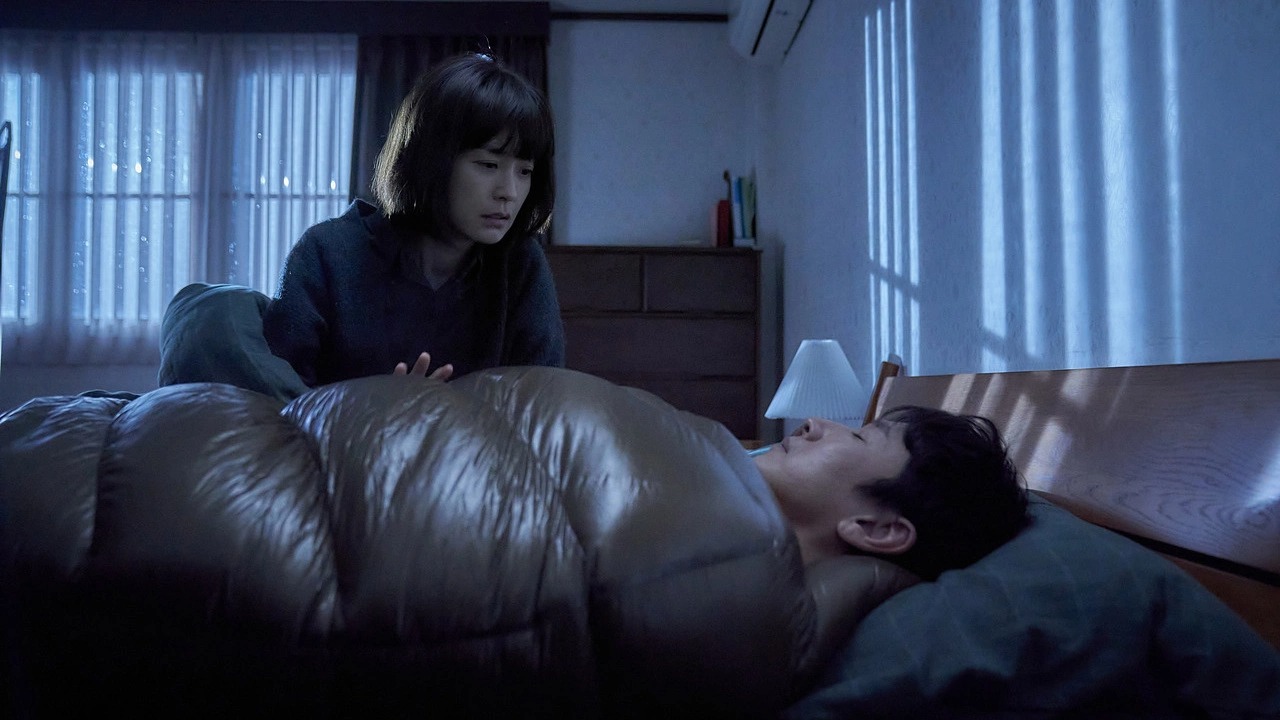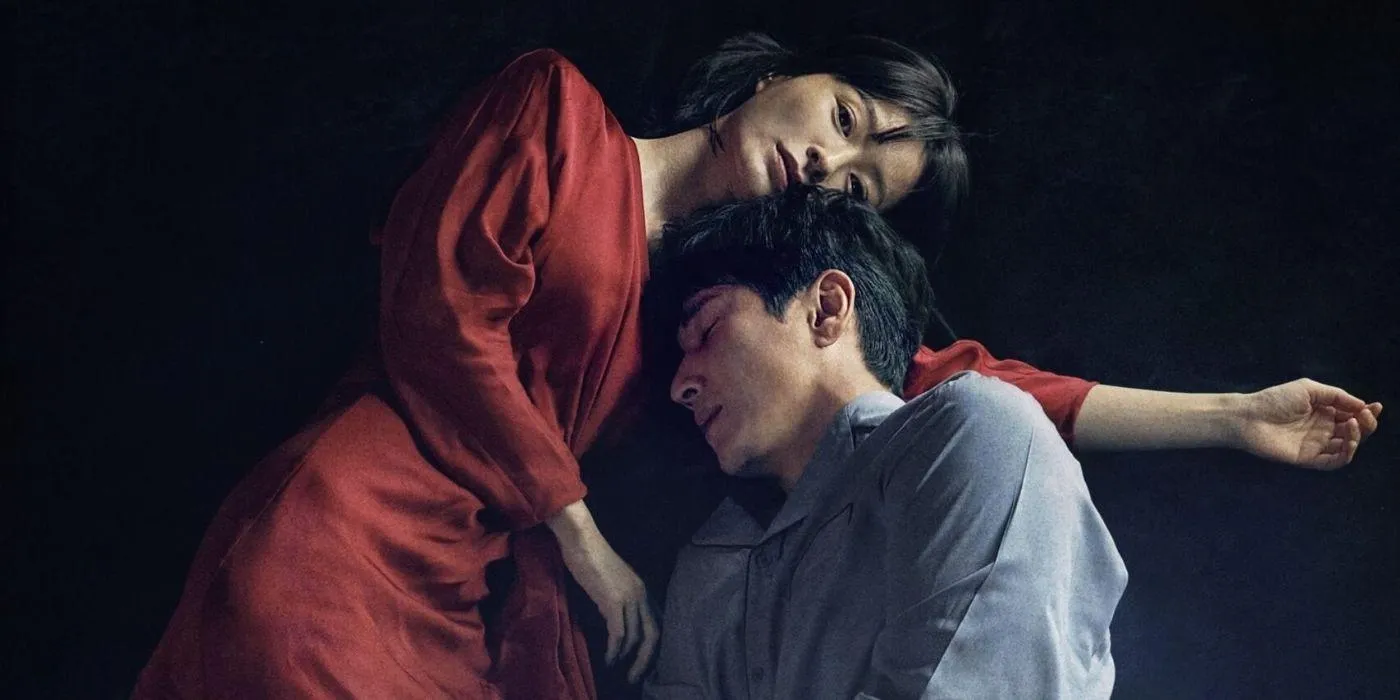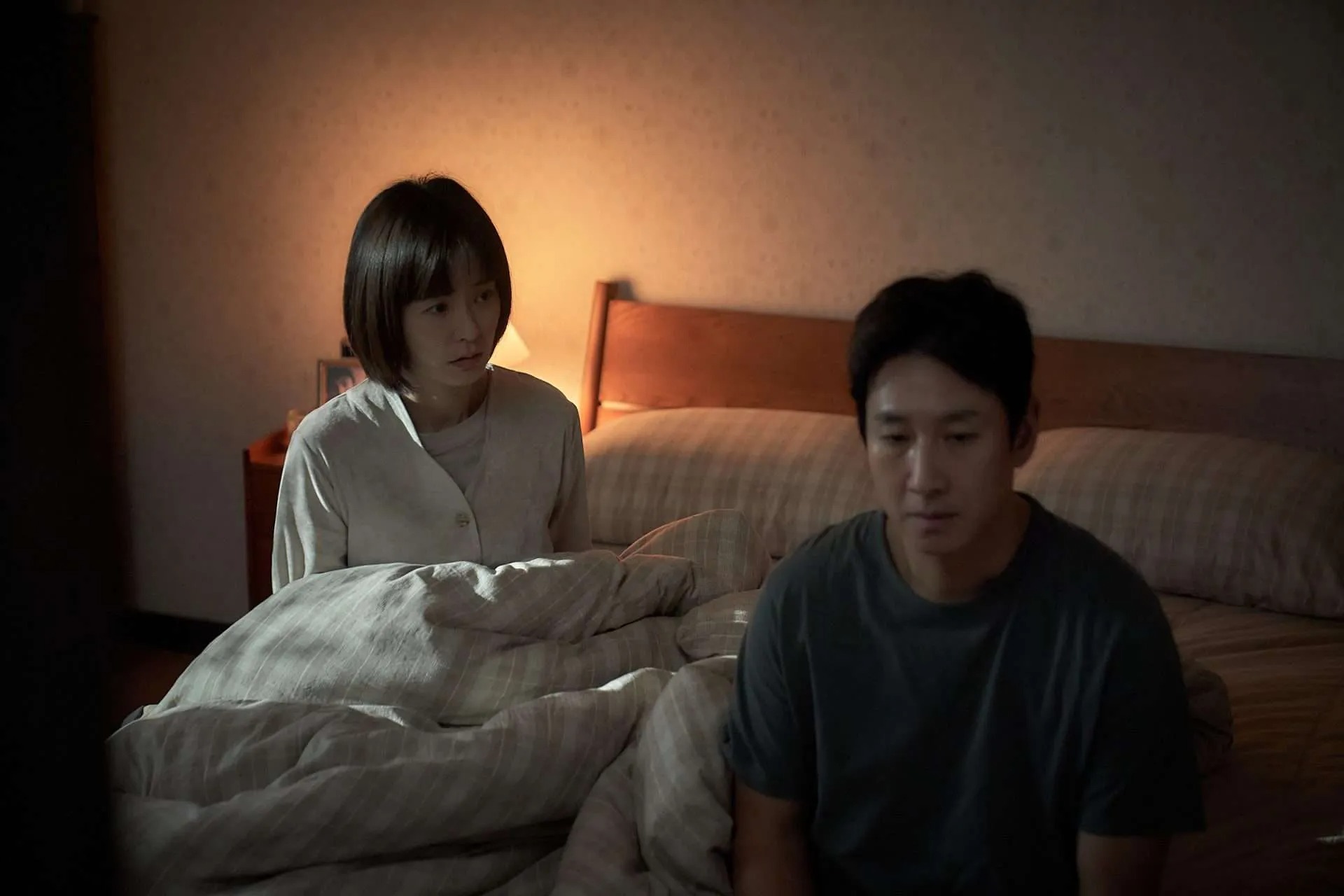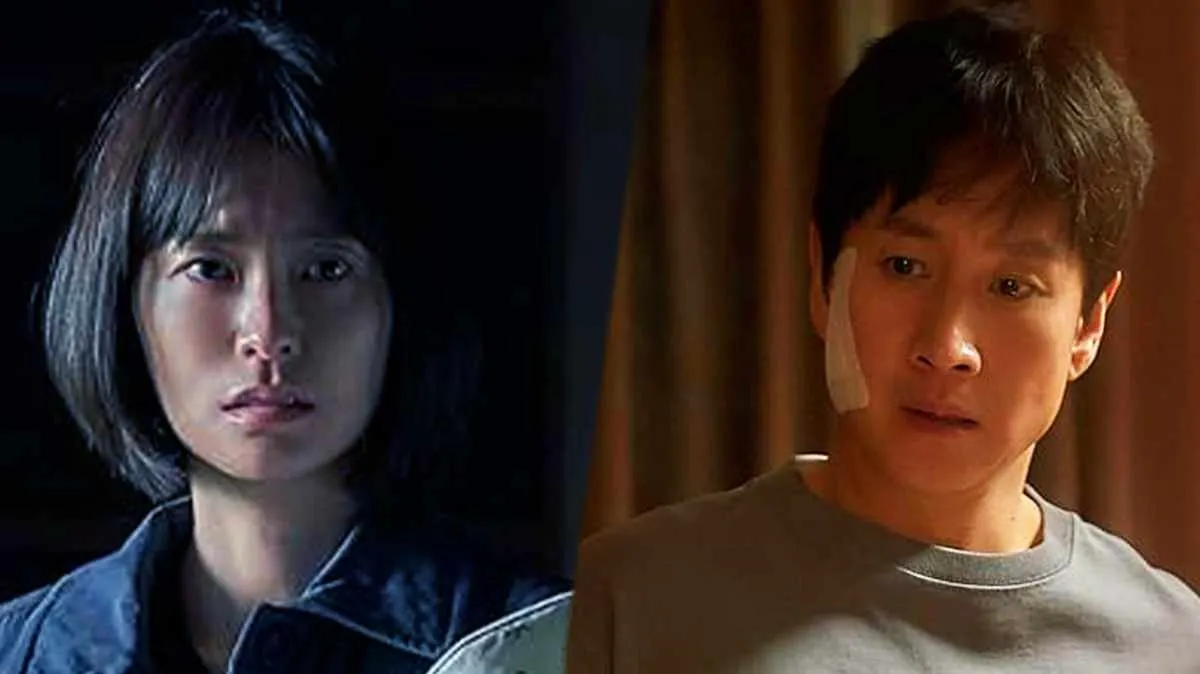Jason Yu’s approach to blending sleepwalking with a structuralist view of marriage takes this film to heights that otherwise might have felt too forced. Marriage is closely tied to capitalism. Without the structure of the family, the whole capitalist system would collapse.
For marriage to function, it must thrive on the insecurities of what the future holds. The emotional vulnerabilities of a married couple, held together by the fragility of family life, are the core of Jason Yu’s Sleep (2023, Original title: Jam).

The link between marriage and children forms the foundation of many social systems. Parents’ constant struggle to protect their children is considered a key component of family life. In creating the film, Jason Yu hinted that he was preparing to get married himself.
The isolation during the COVID lockdown only intensified his exploration of marriage and the dynamics of life with a partner. Relationships face many challenges, but what would happen if one were forced to live with a sleepwalking partner during COVID? Is it terrifying?
True horror lies in the emotional toll a relationship takes when one partner is expected to be perfect. The film also addresses the age-old problem of infidelity that has long plagued marriages.
Sleep (2023) Plot Summary & Movie Synopsis: What Soo-jin Discovers About Her Husband
The movie unfolds in a fairly simple way. Jason Yu splits it into three acts. Soo-jin (played by Jung Yu-mi) and Hyeon-soo (played by Lee Sun-kyun) are a newlywed couple expecting a baby. They are deeply in love, and they believe nothing can tear them apart.
A wooden plaque on their wall reads, “Together, we can overcome everything.” The story opens on a night when Hyeon-soo suddenly sits up in bed, muttering, “Someone’s inside,” before he falls back asleep.
Soo-jin, the pregnant wife, gets up and investigates strange sounds around the house, which turn out to be harmless noises from the wind knocking at the door. As the film continues, Soo-jin realizes her husband is awake at night, engaging in strange behaviors.
The horror escalates when he begins scratching his face while asleep. Soo-jin attempts various methods to stop him, including putting mittens on him to prevent the scratching. He loses his job on a TV show due to the incident. Soon, Soo-jin learns that her husband sleepwalks at night, eating raw meat and eggs.
One night, she follows him and discovers that he has opened a window and tried to jump out. They visit a doctor, who explains that the disturbances are due to issues during Hyeon-soo’s REM sleep cycle. The doctor suggests medication and lifestyle changes, which are humorously depicted in a montage.
Does Yu Take It Too Far?
The couple faces even more difficulties when Hyeon-soo, in one of his sleepwalking episodes, eats the family dog (this scene might be too distressing for dog lovers). The story then moves to the second act, with Soo-jin giving birth to a healthy baby girl.
Her mother believes that Hyeon-soo is possessed by a ghost. While Soo-jin tries to adjust to her new life as a mother, she becomes consumed with fear for her daughter’s safety, her mind running wild with terrible possibilities.
She starts losing faith in science and turns to the occult, hoping it might offer answers that medicine cannot. This turn towards the supernatural is fascinating. Despite being an old practice, the occult begins to feel like a more convincing solution to Soo-jin, who has been severely sleep-deprived.
She and a ghost whisperer attempt to rid Hyeon-soo of the spirit, believing it to be the ghost of an older man who once lived downstairs, and whose spirit seems to have latched onto him because of his connection to Soo-jin. As the film nears its climax, Soo-jin’s grip on reality loosens, and she is sent to a mental institution.
After her return, she reaches a drastic conclusion. The old man’s daughter has inherited the house downstairs, and Soo-jin takes her hostage in a desperate attempt to drive the ghost out of her husband’s body.
She even kills a neighbor’s dog and tries to pierce her skull with a drill in another failed attempt to rid him of the spirit. The film ends with Soo-jin falling asleep in her husband’s arms, seemingly after the ghost has left his body.
The Spirit, or Something More?
One of the most common questions asked in films with supernatural elements is whether the evil spirits are real. Jason Yu raises the same question, but his focus is on the slow erosion of trust in science and medicine.
The doctor continues to assure Soo-jin that the medication might take time to work, but there’s no guarantee of a cure. The idea of possession becomes much more appealing when it offers a quick solution.
Soo-jin is unwilling to accept the delayed resolution that science promises, so she becomes fixated on the notion that her husband is possessed. Her growing obsession with the ghost is further fueled by her sleep deprivation and hallucinations, including one where she dreams of her baby being thrown into a trash can.
How Does Infidelity Manifest in the Script?
Infidelity is an ancient concept in human society, and modern marriages often face the threat of unfaithful partners. In this film, however, no one is unfaithful in the traditional sense. The insecurity is more about emotional and intellectual fidelity.
Jason Yu taps into his fears surrounding infidelity. He shows that infidelity doesn’t always have to be physical; it can be emotional and intellectual as well. The spirit seems to latch onto Hyeon-soo because it desires to be with Soo-jin.

The ghost whisperer makes an intriguing comment that men are all the same, whether alive or dead. This could be a self-reflective moment on the part of the director, who might be projecting his own fears through the film.
The film hints that the promise of partners to face all challenges together is undermined by Hyeon-soo’s avoidance. Instead of confronting the issue, he suggests temporary fixes like moving to a hotel after the baby is born or sleeping in the car.
Soo-jin is the one who continues to bring him back, wanting to solve the problem rather than accepting stopgap measures. It is only when she has completely lost control and is about to harm the old man’s daughter that Hyeon-soo decides to fully support her.
Though they are portrayed as a loving couple, there are times when Hyeon-soo’s lack of communication about his issues makes him emotionally unavailable, which is a form of infidelity. He isn’t physically unfaithful, but emotionally, he is absent, leaving Soo-jin to bear the emotional burden of his condition.
Is Soo-jin to Blame for Everything?
Guilt often leads people to believe things that are not true, and this is the case with Soo-jin. As the occult gradually takes hold and Soo-jin loses touch with reality, she begins to suspect that one of her former lovers is somehow responsible for the possession of her husband’s body.
She even checks her ex-lovers’ profiles to see if anyone is dead. The occultists also suggest that the older man’s ghost wants to be with Soo-jin because of her beauty. In the end, Soo-jin believes she is responsible for everything—the death of the dog, the threat to her baby, and the destruction of her husband’s life.
Though it isn’t entirely her fault, her reaction shows how a guilty mind will try to make sense of things by blaming itself. From the start of the film, Soo-jin’s actions are motivated by guilt. Even as she playfully slaps her husband’s cheek, he begins scratching that same spot, resulting in a disfigured face.
The guilty mind will always try to create reasons to justify its guilt. As the film ends, the spirit, if it even existed, says that it doesn’t understand why Soo-jin is with her husband, hinting that the spirit sought to destroy him because she was seen as being too good for him.
What Happens on the 100th Day?
The film reveals that the spirit must leave by the 100th day, or it will remain forever. With just 15 minutes left on the 100th day, Soo-jin uses a drill to try and drive the spirit out by boring a hole in the side of the spirit’s daughter.

The spirit finally takes over Hyeon-soo’s body, and Hyeon-soo opens the window to release the spirit, as seen in Soo-jin’s iris. The question remains: was there a spirit, or was this all part of Hyeon-soo’s incredible performance?
Hyeon-soo, a former actor, had recently been fired from multiple shows due to his condition and disfigurement. Desperate to be better for his wife, he went to a sleep clinic and was given a clean bill of health, though Soo-jin didn’t believe it.
She became obsessed with the idea of the spirit, convinced that it was real and that it had taken over his body. In a moment of clarity, Hyeon-soo must act to prevent Soo-jin from going too far. His desperation is visible in his bloodshot eyes.
He might have decided to play the part of the older man, despite the doctor’s confirmation that he is physically fine. Hyeon-soo’s goal is to make Soo-jin believe that the spirit has left his body, and they have finally conquered everything together.
Is Sleep a Critique of Modern Marriage?
Sleep serves as a critique of modern marriage. The film dissects the struggles couples face today, showing how modern distractions—often more subtle than infidelity—can be just as damaging.
Jason Yu suggests that marriages are ill-equipped to handle conditions like sleepwalking, which can turn everyday life into a nightmare. The film critiques modern relationships, offering a much deeper perspective on marriage than Noah Baumbach’s Marriage Story.
Through carefully constructed framing, Yu captures the couple’s happiness at the start, gradually shifting the color palette to reflect their growing distress, ending the film with a striking shade of red. Yu approaches marriage from a structuralist viewpoint, acknowledging the many social factors that influence relationships.
Soo-jin is well-educated, but when her partner is in danger, her education gives way to traditional beliefs. The contradictions in the film highlight the complexity of relationships, and this thriller is a perfect example of how multiple viewings are needed to fully understand its deeper meanings.



